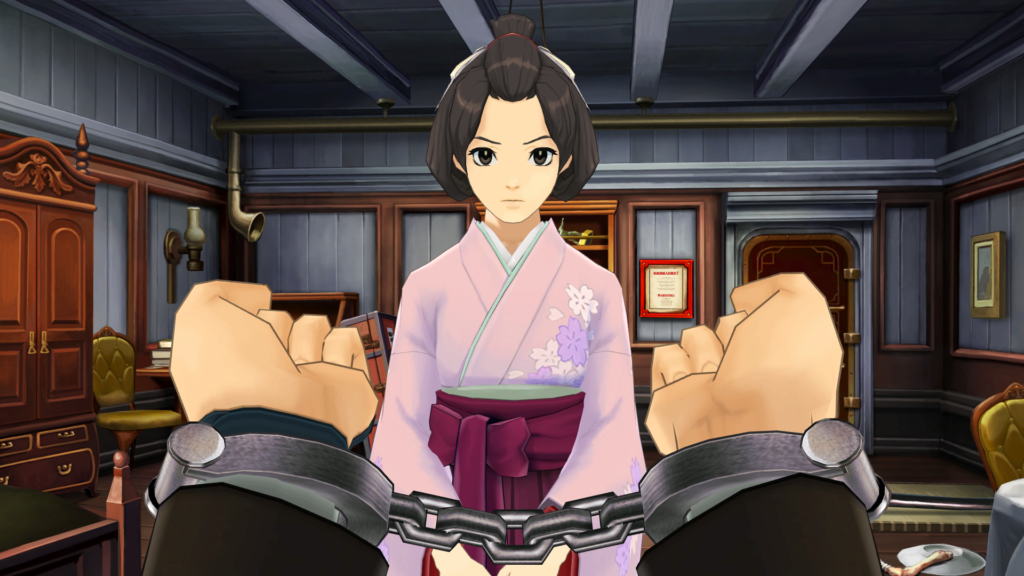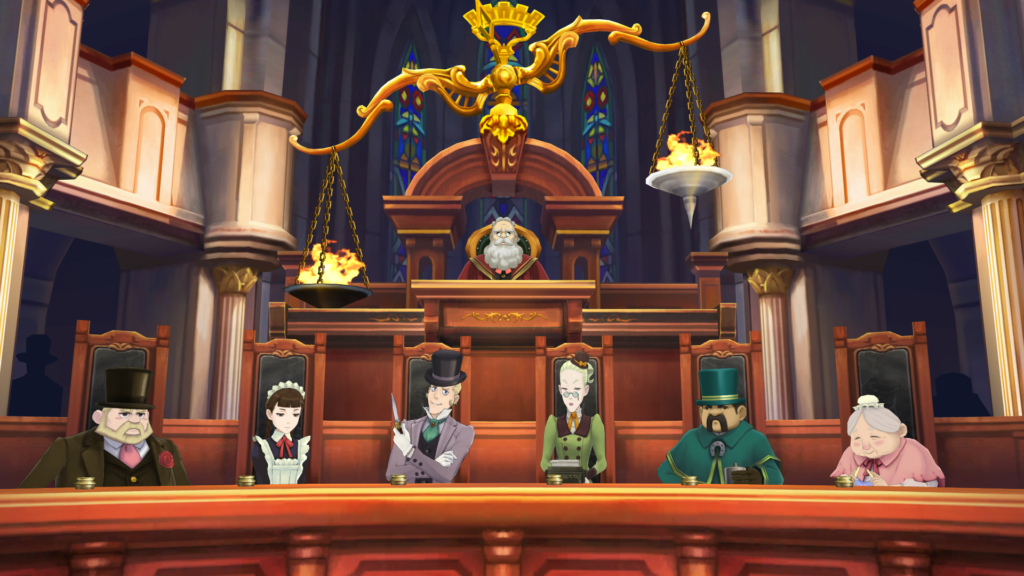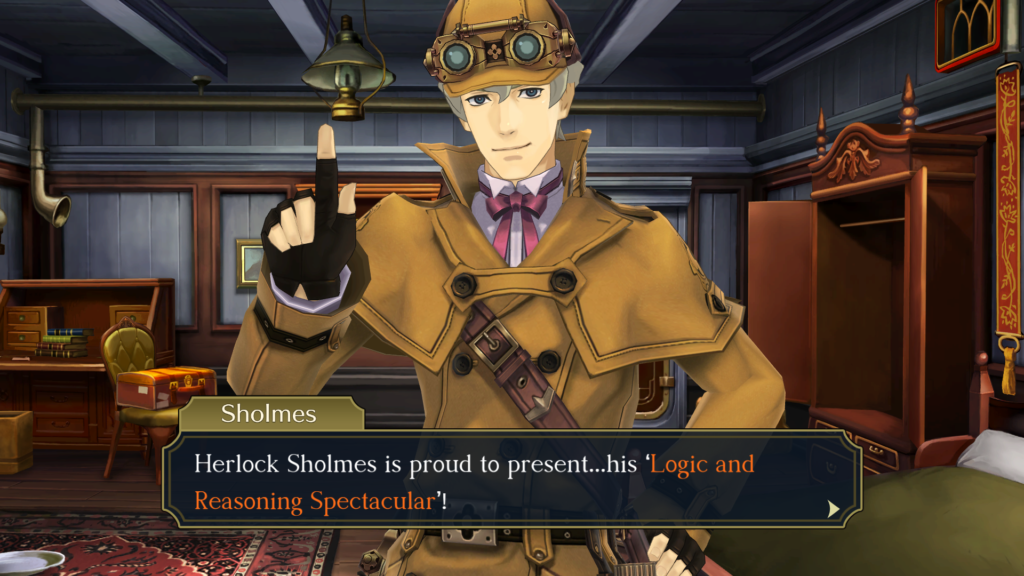Capcom’s deliciously overwrought courtroom drama is back with a vengeance, on a mission to test our legal skills to the absolute maximum.
If there were more games franchises like Ace Attorney, we might begin to question the need for anything discernibly identifiable as gameplay. The Great Ace Attorney Chronicles, like its predecessors, manages to be wildly entertaining and infuriatingly addictive, while possessing gameplay so minimal that for long periods, it can be set to play itself, without requiring any input from you.
It’s the precise polar opposite of all those popular but vacuous games that offer nothing but constant, usually repetitive, fast-twitch action. Instead of giving your fingers a workout, though, it demands constant mental attention, and tests your powers of deduction and observation to the limit. Plus it will make you laugh like a drain.

In case you’ve never come across the Ace Attorney franchise, it’s composed of games in which you play out fraught, labyrinthine and hugely amusing courtroom dramas, invariably taking on the role of defence lawyer, by cross-examining witnesses and applying detective-type skills to the evidence presented with each case. Ace Attorney games are unmistakably Japanese, with their anime-influenced visuals, but are packed with appeal for anyone who loves a good courtroom drama.
The Great Ace Attorney Chronicles charts a specific and fascinating period in courtroom history (albeit with its tongue firmly embedded in its cheek). It casts you as Ryonosuke Naruhodo, first encountered as a student – initially studying an unspecified subject other than law – in a late-19th century Tokyo whose buildings are still largely constructed from wood and paper, and whose legal system is in its infancy.
Poor old Ryonosuke has an incredible propensity for being accused of murders he hasn’t committed, and sure enough, that’s how the game starts, with our hapless hero arrested, gun in hand, after a man is shot in a fancy Tokyo restaurant. Luckily, Ryonosuke’s best friend is law student Kazuma Asogi, who agrees to defend him along with his legal assistant Susato Mikotoba.
Cue the first of many rollercoaster courtroom rides, characterised by unreliable witnesses and cryptic evidence whose existence must often be exposed via cross-examining said witnesses until they break, or harvested using powers of observation at crime scenes. As this is an Ace Attorney game, every character you ever meet is completely over the top – arrogant prosecutors, for example, swig wine from chalices in court, while a supposedly demure British lady in Tokyo hides under a hat which appears to be made from a live swan.

Before long, the action switches to Victorian London – where the modern legal system is beginning to take shape, and our Japanese protagonists want to take its sophistication back to Tokyo – via an interlude on a steamship. There, Ryonosuke meets the most cartoonish character of all: the legendary (and often utterly misguided) Herlock Sholmes and his assistant Wilson, a 13-year-old girl with a medical degree and a penchant for inventing things.

It’s all gleefully silly, and often laugh-out-loud funny. Gameplay-wise, it’s about as far from action-based as could be imagined. It’s one of the most dialogue-heavy games ever – so much so that you can set it to advance dialogue automatically. However, you need to pay close attention to everything that everyone says in court, since before long, you’ll have a chance to cross-examine witnesses, which is where the fun starts.
You can press witnesses if you aren’t convinced by their statements – which can be counter-productive, but only if they’re actually telling the truth, which rarely occurs – and can sometimes switch the spotlight to other witnesses if they react oddly to what is being said on the stand. Do so judiciously, and you will uncover crucial bits of new evidence.
Then, when whatever nemesis of a prosecutor is cross-examining witnesses, you can jump in with objections, which you usually have to back up with evidence. The Great Ace Attorney Chronicles is perhaps slightly more forgiving than some of its predecessors: you have five strikes which are wiped out one by one if, say, you present the wrong evidence, but if you use them up, you’re still allowed to restart from the last major checkpoint.

There’s plenty to do outside the courtroom, too, with crime scenes to investigate (sometimes, you must perform a bit of puzzling to get rid of the over-officious police) and characters involved in your lawsuits to visit and quiz.
If we had one criticism of The Great Ace Attorney Chronicles it would be that sometimes – especially in court – you find yourself becoming a tad frustrated with the sheer rigidity of its structure. Making realisations about the cases you’re involved in is one thing, but you’re sometimes forced to go round in circles, scratching your head, before you’re able to tease out the evidence you need to prove your hypothesis.

And the game also takes the most long-winded route possible – even if you set the dialogue to advance automatically, it will still take you several hours to get through each chapter. That, however, is forgivable, because the dialogue is uniformly brilliant, especially if you are a connoisseur of quirkiness. Don’t let that put you off, however. The Great Ace Attorney Chronicles is a brilliant game: the absolute antithesis of any fast-twitch effort that fails to engage your brain. If you have any sort of an obsession with courtroom dramas, it’s a must-buy, but even if you don’t, it will entertain you royally, thanks to its sheer character, imaginativeness and unmistakably Japanese humour. As long as you have no objection towards using your brain, you will love it.
